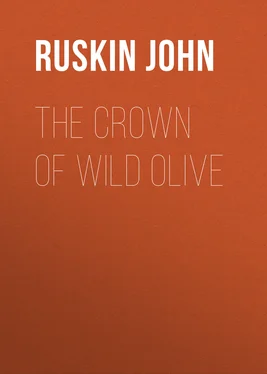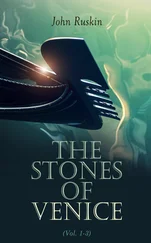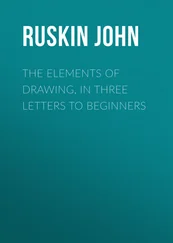John Ruskin - The Crown of Wild Olive
Здесь есть возможность читать онлайн «John Ruskin - The Crown of Wild Olive» — ознакомительный отрывок электронной книги совершенно бесплатно, а после прочтения отрывка купить полную версию. В некоторых случаях можно слушать аудио, скачать через торрент в формате fb2 и присутствует краткое содержание. Жанр: foreign_antique, foreign_home, literature_19, visual_arts, на английском языке. Описание произведения, (предисловие) а так же отзывы посетителей доступны на портале библиотеки ЛибКат.
- Название:The Crown of Wild Olive
- Автор:
- Жанр:
- Год:неизвестен
- ISBN:нет данных
- Рейтинг книги:4 / 5. Голосов: 1
-
Избранное:Добавить в избранное
- Отзывы:
-
Ваша оценка:
- 80
- 1
- 2
- 3
- 4
- 5
The Crown of Wild Olive: краткое содержание, описание и аннотация
Предлагаем к чтению аннотацию, описание, краткое содержание или предисловие (зависит от того, что написал сам автор книги «The Crown of Wild Olive»). Если вы не нашли необходимую информацию о книге — напишите в комментариях, мы постараемся отыскать её.
The Crown of Wild Olive — читать онлайн ознакомительный отрывок
Ниже представлен текст книги, разбитый по страницам. Система сохранения места последней прочитанной страницы, позволяет с удобством читать онлайн бесплатно книгу «The Crown of Wild Olive», без необходимости каждый раз заново искать на чём Вы остановились. Поставьте закладку, и сможете в любой момент перейти на страницу, на которой закончили чтение.
Интервал:
Закладка:
65
["That the sacred grove is nothing but logs."]
66
Ames, by report of Waldo Emerson, says "that a monarchy is a merchantman, which sails well, but will sometimes strike on a rock, and go to the bottom; whilst a republic is a raft, which would never sink, but then your feet are always in the water." Yes, that is comfortable; and though your raft cannot sink (being too worthless for that), it may go to pieces, I suppose, when the four winds (your only pilots) steer competitively from its four corners, and carry it, ως οπωρινος Βορεης φορεησιν ακανθας, and then more than your feet will be in the water.
67
["Not with water, but with ruin." The worst ruin being that which the Americans chiefly boast of. They sent all their best and honestest youths, Harvard University men and the like, to that accursed war; got them nearly all shot; wrote pretty biographies (to the ages of 17, 18, 19) and epitaphs for them; and so, having washed all the salt out of the nation in blood, left themselves to putrefaction, and the morality of New York.]
68
[This paragraph contains the gist of all that precede.]
69
[Whenever you are puzzled by any apparently mistaken use of words in these essays, take your dictionary, remembering I had to fix terms, as well as principles. A Duke is a "dux" or "leader;" the flying wedge of cranes is under a "ducal monarch"—a very different personage from a queen bee. The Venetians, with a beautiful instinct, gave the name to their King of the Sea.]
70
[This is a perfect picture of the French under the tyrannies of their Pelican Kings, before the Revolution. But they must find other than Pelican Kings—or rather, Pelican Kings of the Divine brood, that feed their children, and with their best blood.]
71
[Read carefully, from this point; because here begins the statement of things requiring to be done, which I am now re-trying to make definite in Fors Clavigera .]
72
["Evil on the top of Evil." Delphic oracle, meaning iron on the anvil.]
73
[Permit me to enforce and reinforce this statement, with all earnestness. It is the sum of what needs most to be understood in the matter of education.]
74
[A pregnant paragraph, meant against English and Scotch landlords who drive their people off the land.]
75
[In Lucian's dialogue, "The sale of lives."]
76
[I raise this analysis of the Tempest into my text; but it is nothing but a hurried note, which I may never have time to expand. I have retouched it here and there a little, however.]
77
Of Shakspeare's names I will afterwards speak at more length; they are curiously—often barbarously—much by Providence,—but assuredly not without Shakspeare's cunning purpose—mixed out of the various traditions he confusedly adopted, and languages which he imperfectly knew. Three of the clearest in meaning have been already noticed. Desdemona, "δυσδαιμονια," "miserable fortune," is also plain enough. Othello is, I believe, "the careful;" all the calamity of the tragedy arising from the single flaw and error in his magnificently collected strength. Ophelia, "serviceableness," the true lost wife of Hamlet, is marked as having a Greek name by that of her brother, Laertes; and its signification is once exquisitely alluded to in that brother's last word of her, where her gentle preciousness is opposed to the uselessness of the churlish clergy—"A ministering angel shall my sister be, when thou liest howling." Hamlet is, I believe, connected in some way with "homely" the entire event of the tragedy turning on betrayal of home duty. Hermione (ερμα), "pillar-like," (ἡ ειδος εχε χρυσης 'ἡειδος Αφροδιτης). Titania (τιτηνη), "the queen;" Benedict and Beatrice, "blessed and blessing;" Valentine and Proteus, enduring (or strong), (valens), and changeful. Iago and Iachimo have evidently the same root—probably the Spanish Iago, Jacob, "the supplanter," Leonatus, and other such names, are interpreted, or played with, in the plays themselves. For the interpretation of Sycorax, and reference to her raven's feather, I am indebted to Mr. John R. Wise.
78
In the present general examination, I concede so much to ordinary economists as to ignore all innocent poverty. I adapt my reasoning, for once, to the modern English practical mind, by assuming poverty to be always criminal; the conceivable exceptions we will examine afterwards.
79
[I have no terms of English, and can find none in Greek nor Latin, nor in any other strong language known to me, contemptuous enough to attach to the bestial idiotism of the modern theory that wages are to be measured by competition.]
80
I say nothing yet of the quality of the servants, which, nevertheless, is the gist of the business. Will you have Paul Veronese to paint your ceiling, or the plumber from over the way? Both will work for the same money; Paul, if anything, a little the cheaper of the two, if you keep him in good humour; only you have to discern him first, which will need eyes.
81
[I have not altered a syllable in these three paragraphs, 137, 138, 139, on revision; but have much italicised: the principles stated being as vital, as they are little known.]
82
By his art he may; but only when its produce, or the sight or hearing of it, becomes a subject of dispute, so as to enable the artist to tax the labour of multitudes highly, in exchange for his own.
83
[Observe this; the legal right to keep what you have worked for, and use it as you please, is the corner-stone of all economy: compare the end of Chap. II.]
84
[I should now put the time of necessary labour rather under than over the third of the day.]
85
[See Preface to Unto this Last .]
86
I have not hitherto touched on the subject of interest of money; it is too complex, and must be reserved for its proper place in the body of the work. The definition of interest (apart from compensation for risk) is, "the exponent of the comfort of accomplished labour, separated from its power;" the power being what is lent: and the French economists who have maintained the entire illegality of interest are wrong; yet by no means so curiously or wildly wrong as the English and French ones opposed to them, whose opinions have been collected by Dr. Whewell at page 41 of his Lectures ; it never seeming to occur to the mind of the compiler, any more than to the writers whom he quotes, that it is quite possible, and even (according to Jewish proverb) prudent, for men to hoard as ants and mice do, for use, not usury; and lay by something for winter nights, in the expectation of rather sharing than lending the scrapings. My Savoyard squirrels would pass a pleasant time of it under the snow-laden pine branches, if they always declined to economize because no one would pay them interest on nuts.
[I leave this note as it stood: but, as I have above stated, should now side wholly with the French economists spoken of, in asserting the absolute illegality of interest.]
87
Compare Chaucer's feeling respecting birds (from Canace's falcon, to the nightingale, singing, "Domine, labia—" to the Lord of Love), with the usual modern British sentiments on this subject. Or even Cowley's:—
Читать дальшеИнтервал:
Закладка:
Похожие книги на «The Crown of Wild Olive»
Представляем Вашему вниманию похожие книги на «The Crown of Wild Olive» списком для выбора. Мы отобрали схожую по названию и смыслу литературу в надежде предоставить читателям больше вариантов отыскать новые, интересные, ещё непрочитанные произведения.
Обсуждение, отзывы о книге «The Crown of Wild Olive» и просто собственные мнения читателей. Оставьте ваши комментарии, напишите, что Вы думаете о произведении, его смысле или главных героях. Укажите что конкретно понравилось, а что нет, и почему Вы так считаете.












